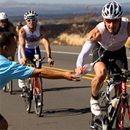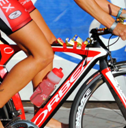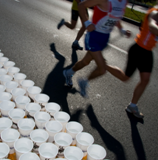
|
Fuelling for performance! I thought now would be a good time to write on fuelling. We are at the start of the race season and so all triathletes will need nutrition strategies. A well-trained athlete will have around 90min worth of glycogen and water stored in their body when well fed and well rested/hydrated. So, racing over a distance longer then 90min will require you to fuel and drink. You will need to consume roughly 1 gm of carbohydrate (CHO) per kg of bodyweight per hour. For most athletes (60-80kg) 60g of CHO per hr works well as rule of thumb, if you are a bit lighter or heavier you will need to adjust this slightly. |
|
Most gels contain around 30g CHO as does 500ml of sports drink, a medium sized banana, most energy bars and a slice of bread and jam. So for most consuming any one of these (or anything else containing 30gm of simple sugar) every 30mins will keep you moving along nicely. Note, a gel takes around 20min to clear the stomach, solids 40mins. Also please check nutritional info as the amount of carbs will vary from product to product.
On the hydration front you will need roughly 500ml per hour on a typical UK summer day as soon as your race goes much beyond 90mins. If the temperature is above 25° you should be getting up to 750ml per hr and over 30° around 1000ml.
 Please understand that both hydration and nutrition are very personal and all advised amounts are general so may not
completely apply to you. It is also relatively common for some people to get GI problems with certain products. So, you
will need to trial both feeding and drinking strategies to you find what works best for you. Both in terms of how much you
need, and which products work best. Check to see what products the races you are doing are using and train with these first
to see how you go – if you don’t get on with them you will need to be self sufficient!
Please understand that both hydration and nutrition are very personal and all advised amounts are general so may not
completely apply to you. It is also relatively common for some people to get GI problems with certain products. So, you
will need to trial both feeding and drinking strategies to you find what works best for you. Both in terms of how much you
need, and which products work best. Check to see what products the races you are doing are using and train with these first
to see how you go – if you don’t get on with them you will need to be self sufficient!
Hydration rates can be worked out precisely by your sweat rate. If you are racing in hot climates this is worth working out but does need to be worked out at approximately the same climate to that which you will experience on race day. To do this, simply weigh yourself before, then again post session. The difference in weight, pre/post, plus any additional fluid you have drunk during, equals your sweat rate.
Pre Race
Eat a well-practiced pre race meal around 3hours before – best to stick with processed low residue type CHO such as white bread/white pasta as these are less likely to cause any GI problems during the race. Then aim to have an energy bar or similar around 60min before the start. In a UK summer race drink around 500ml of fluid, assuming you are well hydrated overnight, aiming to finish drinking around 60mins before, so you don’t end up being desperate for the loo. If it is hot you might need more and you might need to keep sipping water up to the start.
Sprint
Sub 90mins - other then having a small amount of water in your bottle to wet your whistle, you will not need anything else. 90mins to 2hrs - you will need to take 30g CHO, either as a gel or as 500ml of sports drink. If taking a gel wash this down with around 250ml of water. Eat/drink early on the bike to lessen chance of GI problems.
Olympic
Sub 2h30mins – 2 gels one at the start one at the end of the bike (first/last 5km) + 750ml of fluid as 500ml sport drink
250ml water (UK summertime). Drink most of your fluid early on during the bike to reduce risk of GI issues.
2h30mins -3h – as above + 1 gel on the run and around 250ml more fluid on the bike.
3h-3h30mins –as sub 2h30mins + 2 extra gels (1 bike/ 1 run) and 500ml more water OR 1 gel and 500ml sport drink
3h30mins-4h - as sub 2h30mins + 3 extra gels (1 bike/ 2 run) and 750ml more water OR 2 gels and 500ml sport drink + 250ml water
70.3 and IM
The Bike
In a 70.3 aim to start eating 20min or so into the ride to let your stomach settle, especially after a sea swim. If you are swimming close to an hour then don’t leave it too long before you start eating. In an IM you need to start eating/drinking pretty quickly especially if swimming well above an hour, so start as soon as your stomach feels ok. Thereafter eat/drink 30g CHO every 30mins, whilst drinking 500ml per hour (UK summer) or more if hotter. Some people do not like taking gels for the entire race as they are so sweet and so would rather start with solids. This is fine. If eating solids switch to gels/liquids with 40-60min to go on the bike to lessen any risk of GI issues. It is a good idea if hot in a 70.3 and whatever the temperature in an IM to supplement any water you drink with a salt tablet, this will ensure replacement of all minerals lost through sweat and so prevent cramping as the race continues. Nuun, High 5 Zero and Isostar are popular.
 There are many options for how to store food on the bike the most common ones are: a bag on your top tube,
sometimes called a bento box, as well as pockets in your tri suit. Or if using gels you can empty your entire
bike supply into one bottle or you can tape them onto the top tube – if clever with the taping you can open the gel
as you rip it off. See top tube in picture.
There are many options for how to store food on the bike the most common ones are: a bag on your top tube,
sometimes called a bento box, as well as pockets in your tri suit. Or if using gels you can empty your entire
bike supply into one bottle or you can tape them onto the top tube – if clever with the taping you can open the gel
as you rip it off. See top tube in picture.
The Run
On the run you will need to use gels or drink and follow the same plan – 60g of CHO per hour. Feed stations will generally give gels/sports drink/water as well as other stuff. It is worth working out how many cups of fluid per hour you will need both to maintain hydration and to get enough energy on board.
 A standard plastic cup = 230ml. Assume it wont be full and you will spill a bit, that leaves around 200ml.
Assuming it is full of sports drink at standard solution (e.g. 500ml = 30g CHO) then that will give you around 12g of CHO per 200ml.
This will mean 2.5 cups per hour will give you 500ml of fluid + 36g of CHO, so another gel per hour should see you right.
Coke is very good in races, if flat. Most people who suffer with GI issues get on well with it. It contains caffeine and is more CHO dense
then sport drinks, a 200ml serving would give you 21.4 g of CHO. So 2½ cups of coke would give you 500ml (assuming no spillages and they have 200ml in each cup) and 64 g of CHO per hour, so no need for an extra gel.
If not drinking coke caffeine gels provide a useful boost if and when you start to feel really tired.
A standard plastic cup = 230ml. Assume it wont be full and you will spill a bit, that leaves around 200ml.
Assuming it is full of sports drink at standard solution (e.g. 500ml = 30g CHO) then that will give you around 12g of CHO per 200ml.
This will mean 2.5 cups per hour will give you 500ml of fluid + 36g of CHO, so another gel per hour should see you right.
Coke is very good in races, if flat. Most people who suffer with GI issues get on well with it. It contains caffeine and is more CHO dense
then sport drinks, a 200ml serving would give you 21.4 g of CHO. So 2½ cups of coke would give you 500ml (assuming no spillages and they have 200ml in each cup) and 64 g of CHO per hour, so no need for an extra gel.
If not drinking coke caffeine gels provide a useful boost if and when you start to feel really tired.
Final Thoughts
Forgetting to eat/drink is common in long races and can very quickly ruin your day, it is easy to get caught up in the moment while feeling great and forget to eat/drink. Have a plan and stick to it rigidly. Setting a timer on your watch is normally the best way to ensure you don’t forget. And finally make sure you practice, your stomach needs training like the rest of your body, it will not thank you if you don’t train it too!
